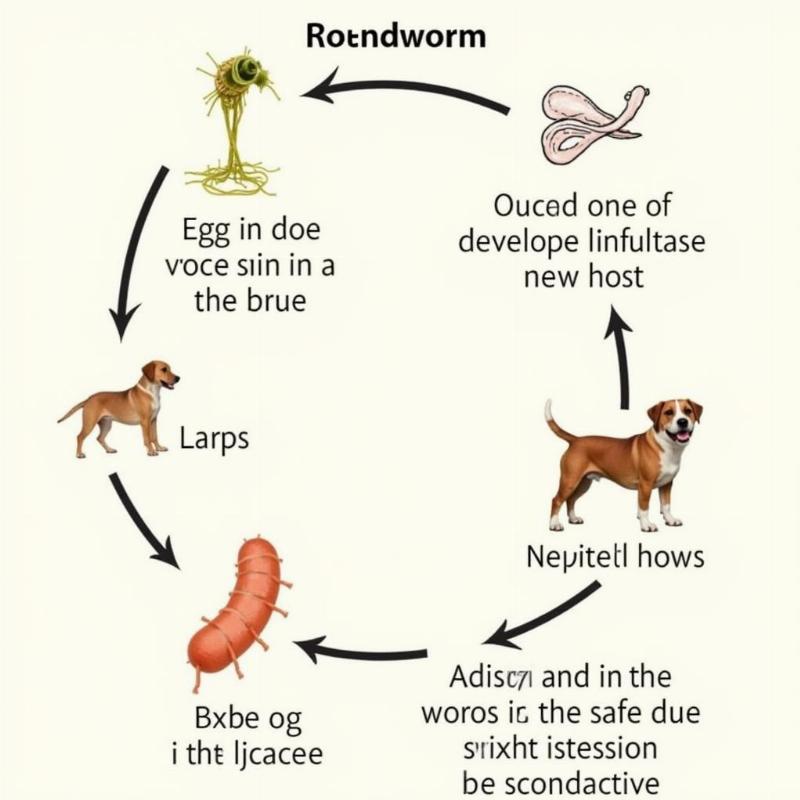Dog owners often wonder about the mysteries hidden within their dog’s waste. One common question is, “Do worms eat dog poop?” Understanding this can be crucial for maintaining your dog’s health and the cleanliness of your environment. This article delves into the relationship between worms and dog feces, exploring the types of worms that might be attracted to it and the potential risks involved.
Worms don’t typically eat dog poop in the same way your dog eats kibble. However, dog feces can be a breeding ground for certain types of worms and their eggs. The environment provides moisture and nutrients that some worm eggs need to develop into larvae, which can then infect other dogs or even humans. This makes proper disposal of dog waste vital.
Types of Worms Associated with Dog Feces
Several types of intestinal parasites can be transmitted through dog feces, including:
- Roundworms: These common parasites can be found in puppy feces and are easily spread to other dogs through ingestion of contaminated soil or feces.
- Hookworms: Hookworms can also be present in dog poop and pose a risk to both dogs and humans. They can penetrate the skin, causing itching and discomfort.
- Whipworms: Whipworms live in the large intestine of dogs and can be difficult to detect. Their eggs are passed in the feces and can contaminate the environment.
- Tapeworms: While less common, tapeworms can also be transmitted through dog feces, especially if the dog has ingested infected fleas.
 Life Cycle of Roundworms in Dog Poop
Life Cycle of Roundworms in Dog Poop
The Risks of Worm-Contaminated Dog Poop
Leaving dog poop unattended can create several health risks:
- Infection of other dogs: If another dog comes into contact with contaminated feces, they can ingest the worm eggs or larvae and become infected.
- Infection of humans: Some worm larvae can penetrate human skin, causing skin irritation and other health problems. Children are particularly vulnerable due to their tendency to play in dirt.
- Environmental contamination: Worm eggs can persist in the soil for extended periods, contributing to environmental contamination and increasing the risk of infection for both animals and humans.
Preventing Worm Infestations
Regular deworming is essential for preventing worm infestations in dogs. Consult your veterinarian to determine the appropriate deworming schedule for your dog based on their age, breed, and lifestyle.
What to Do if You Suspect Your Dog Has Worms
If you notice any signs of worms in your dog’s poop, such as visible worms, unusual stool consistency, or your dog exhibiting symptoms like vomiting, diarrhea, or weight loss, consult your veterinarian immediately. They can perform a fecal examination to diagnose and recommend appropriate treatment.
Conclusion
While worms don’t directly eat dog poop, the feces can harbor worm eggs and larvae, posing health risks to other dogs, humans, and the environment. Regular deworming, proper poop disposal, and maintaining good hygiene practices are crucial for preventing worm infestations and protecting your furry friend and your community. Don’t hesitate to contact your veterinarian if you have any concerns about your dog’s health or suspect a worm infestation.
FAQ
- How often should I deworm my dog? Consult your veterinarian for the best deworming schedule for your dog, but generally, puppies and adult dogs should be dewormed regularly.
- Can I see worms in my dog’s poop? Sometimes, adult worms are visible in dog feces, but not always. Microscopic examination by a veterinarian is the most reliable way to diagnose a worm infestation.
- How can I prevent my dog from getting worms? Regular deworming, proper poop disposal, and preventing your dog from eating other animals’ feces are key preventative measures.
- Are all worms in dog poop harmful to humans? Some types of worms found in dog feces can be transmitted to humans and cause health problems, so always practice good hygiene.
- What are the signs of a worm infestation in dogs? Symptoms can include vomiting, diarrhea, weight loss, a pot-bellied appearance, and visible worms in the stool or vomit.
- Can I buy deworming medication over the counter? Yes, but it is always recommended to consult with your veterinarian for the appropriate type and dosage for your dog.
- Is it harmful to compost dog poop? Composting dog poop is generally not recommended due to the risk of parasite contamination unless done under specific high-heat conditions.
Related Articles
- looks like corn in dog poop
- sign for pick up dog poop
- dog pooping in my yard
- clean after your dog sign
Beautdogs.us is your premier online destination for comprehensive and reliable information on dog breeds, dog care, and the best products for your canine companion. Whether you’re a seasoned dog owner or just starting your journey, Beautdogs.us provides expert advice and resources to help you provide the best possible care for your furry friend. From breed-specific guides to health and wellness tips, we’ve got you covered. Contact us today for any questions! Email: [email protected], Phone: +1 501-555-7529.